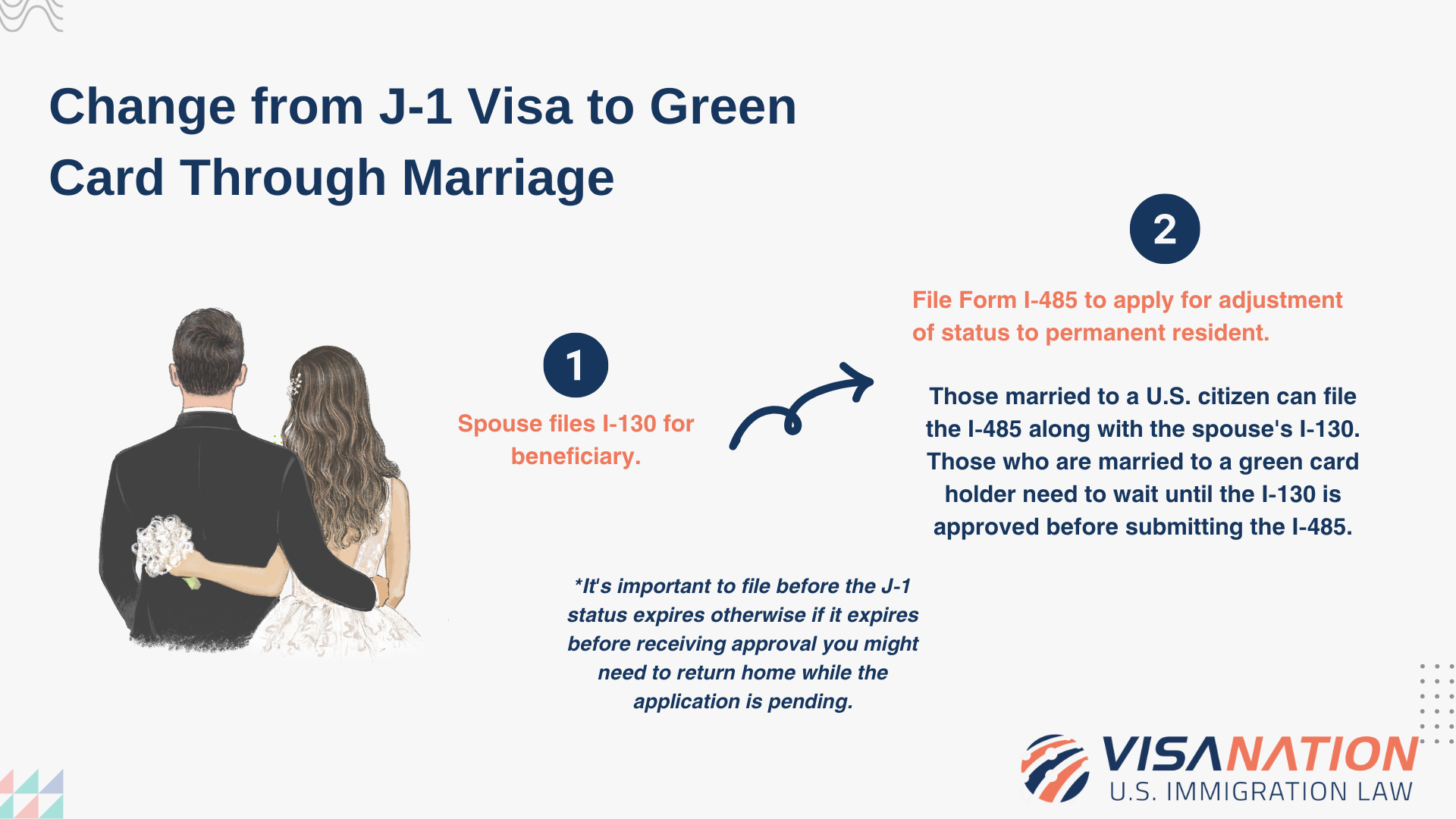The J-1 visa is a common nonimmigrant work and study visa that encourages foreign nationals to come to the U.S. temporarily to learn and gain skills to take back to their home country. J-1 visa holders can marry U.S. citizens, but that does not automatically qualify them for permanent resident status (green card). To make that transition, several steps must take place. In this guide, learn about how to make the J-1 to green card transition, the 90-day rule, adjusting status, the I-130 process, adjusting status, and how a lawyer can guide you on eligibility.
The J-1 to a marriage green card process is common, but it can be complicated. Because the stakes are high, any minor mistake can be detrimental. At VisaNation law firm, we focus on getting the best results for each client.
Increase Your Green Card Approval Chances with VisaNation
How to Change a J-1 Visa to a Green Card Through Marriage
The process below outlines the steps to change from a J-1 visa to a green card, once you have an approved J-1 waiver.
- Spouse (your U.S. citizen spouse/lawful permanent resident spouse) files Form I-130, Petition for Alien Relative, for you, the beneficiary.
- After the I-130 is filed (or is approved), it’s time to file Form I-485 to apply for adjustment of status to permanent resident. Those married to a U.S. citizen can file the I-485 along with the spouse’s I-130. Those who are married to a green card holder need to wait until the I-130 is approved before submitting the I-485.

J-1 Visa to Green Card Requirements
Many J-1 visa holders who would like to live permanently in the U.S. through a green card look to marriage as their only option. There is no law preventing them from marrying a U.S. citizen, but there is more to getting a green card than marriage. Obstacles such as the home residency requirement must be met or waived before a J-1 holder who marries a U.S. citizen can seek permanent residence.
The Home Residency Requirement
A J-1 visa does not have “dual intent,” which means that you cannot have the intent to get a green card when you apply. This can create issues if you are not careful when pursuing a green card while on J-1 status. One way that the USCIS encourages J-1 holders to make their stay temporary is through the home residency requirement.
This requirement states that most J-1 visa holders must return to their home countries for at least 2 years after their J-1 visa validity period has expired. You must be physically present in the home country for a total of two years before being able to apply or petition for any immigrant or nonimmigrant status in the U.S.
Many individuals wonder why they are subject to the 2-year physical presence requirement. The purpose of a J-1 visa is a cultural exchange program between the U.S. and other countries. In other words, after your time in the United States, you are expected to return to your home country and either share or utilize the skills learned. If one does not return to their home country, then the “cultural exchange” cannot take place.
Those who are subject to this J-1 requirement include:
Government-Funded Exchange Programs
Are you part of a government-funded exchange program? In other words, was the J-1 program financed in part or in whole (indirectly or directly) by the United States government or the government from your home country?
Complete Your Green Card Application Today
Graduate Medical Education or Training
Those who are completing a medical residency program on their visa are subject to the home country requirement.
Programs for Teaching Specialized Skills or Knowledge
Is your area of study considered under the field of specialized skills or knowledge by your home country? If so, you must fulfill the two-year requirement.
The Federal Government has determined that certain skills are needed in certain countries. If you come from a country that needs the skill that you have worked or studied in the U.S., you will be subject to the home residency requirement. Be sure to check the skills list to see if your skills and country require you to return home after your stint.
Example: Canada is not in need of any skills, so it does not appear on the list. On the other hand, India has a need for many skills, so most J-1 holders will be subject to the requirement.
Am I subject to the Home Residency Requirement?
The good news is that not all J-1 individuals must fulfill the two-year home country requirement.
One of the ways to know for sure if you are subject to this requirement is to double-check your Certificate of Eligibility (Form DS-2019). There is a specific space that indicates whether you are subject to this requirement, but you should also refer to the visa that was given by the U.S. consulate.
If your DS-2019 has the first box checked off in the lower left corner specifying that you are “Not subject to the two-year residence requirement,” then you do not need to apply for a waiver.

How To Apply for a J-1 Visa Waiver?
Applying for a waiver allows you to simultaneously stay in the country while you adjust your status to get a green card. Here are some of the bases for obtaining this waiver.
- Getting a “no-objection statement” from your home country’s government.
- Your spouse (U.S. citizen or legal permanent resident) or child would face exceptional hardship should you be denied a green card and forced to return to your home country.
- You would face persecution by returning to your home country.
- Request by an interested U.S. federal government agency
- Request by a designated state public health department or its Equivalent (Conrad State 30 Program)
Note that you will not be permitted to extend your J-1 status beyond the end date listed on your DS-2019. If the Department of State denied your request for a waiver and you haven’t passed the date listed on your DS-2019, then your best option may be to apply for an extension. Feel free to reach out to our team of attorneys, who can guide you.
No Objection Statement
The no-objection statement must confirm that the individual’s home country has no objection to them not returning to their home country to fulfill the two-year home country physical presence requirement and potentially becoming a U.S. lawful permanent resident.
- Learn how to request a No Objection Statement
Not Subject to the 2-Year Requirement
In the event that your J-1 visa did not come with the home presence requirement, then upon marrying a U.S. citizen, you will be able to file the application paperwork to adjust your status immediately.
Expect to submit all your fees and documents, including the I-485, by mail to U.S. Citizenship and Immigration Services (USCIS).
J-1 to Marriage Green Card Processing Time
If you are marrying a U.S. citizen, it will take around 9.5 months with concurrent processing to get a green card, according to USCIS data. Our firm is seeing cases get approved within 8 months. However, if you are married to a permanent resident, you have to wait for your priority date to be current. This takes around 39 months to process, according to the May 2025 Visa Bulletin.
Unfortunately, there is no way to expedite the adjudication with premium processing. You can apply for a work permit (I-765 form) and a travel document (I-131 form) while your petition is being processed.
Also, remember that you will need to maintain your immigrant status during this time. Visas like the H-1B allow holders to extend their validity period past the six-year maximum if they are waiting on their I-140 priority date. However, J-1 validity periods are based on the length of the program that has sponsored you, so you will need to reach out to a representative for that program to see about extending your status while you wait for your I-130 to be processed, if necessary.
Get Green Cards for Your Spouse with VisaNation
Consular Processing and Interview
Alternatively, if your J-1 status ends before your green card is issued, you can leave the country and return when the I-130 is approved. However, you will not be adjusting your status with the I-485. Instead, you will go through consular processing. This involves traveling to a U.S. consulate or embassy in your home country and attending an interview with a consular officer.
In either case, whether you are adjusting your status or going through consular processing, you will need to take part in an interview that includes you and your spouse. An immigration officer will ask you a series of questions for the marriage-based green card to determine if your marriage is legitimate and not a fraudulent attempt to immigrate to the U.S. If your relationship is genuine, then simply answer as honestly as you can. However, if red flags begin to pop up, the officer may choose to interview you and your spouse separately and compare your answers. Speak with your immigration attorney to make sure that you are prepared for your interview.
The 90-Day Rule
The 90-day rule is a benchmark used by immigration officials to gauge whether an individual has misrepresented their intentions when applying for a nonimmigrant visa (like a J-1 visa). Even if you are under a J-1 waiver and intend to marry a U.S. citizen, you can still face some difficulties due to the 90-day rule.
- Within 90 Days: If an individual engages in activities suggestive of immigrant intent (like marrying a U.S. citizen or initiating a green card application) within 90 days of entering the U.S. on a nonimmigrant visa, it might be inferred that they had another intent for being in the U.S. during the visa application process.
- After 90 Days: If the same activities take place past the initial 90-day period post-entry, there is typically no automatic presumption of misrepresentation. However, immigration authorities may still scrutinize the individual’s intent. It’s important to note that the 90-day rule doesn’t universally apply to all nonimmigrant visas, and its application can be contingent upon individual circumstances.
If you apply for a marriage-based green card within the first three months of your arrival in the country, immigration officers can put your application under higher scrutiny. In some cases, you can even be accused of misrepresenting your intention to move to the U.S.
TIP: It’s best to wait at least 90 days after arriving in the U.S. before filing any immigration petition.
You would fall under the 90-day rule from the moment when you have entered the U.S. for the first time on your J-1 visa and not on any other type of visa. In some instances, you can check your I-94, Arrival/Departure Record, if you are struggling to remember when you arrived in the country. For example, if you entered the U.S. on 1 August 2024, the rule would apply to you until 30 October 2024.
If you originally entered the U.S. on a different type of visa and then received a J-1 visa while being in the country, then your 90-day rule would start when you first entered the U.S. on your non-J-1 visa.
Conditional Green Card
If you do finally make the transition from J-1 visa status to a marriage-based green card, there may be one last hitch. If your marriage is less than 2 years old, then you will be issued a conditional green card, CR-1. This visa is only valid for 2 years. At that time, you and your spouse will need to return and file to remove the conditions for you to obtain a full-fledged green card, which is valid for ten years at a time. It is important to note that you must apply to remove conditions within 90 days of the expiration of your CR-1 visa.
If your spouse is not able to file (if you have divorced your spouse or if your spouse has passed away), then you will need to file a waiver showing that you entered into the marriage in good faith. With this waiver, you may still be able to remove the conditions on your green card.
We are Here to Reunite Your Family
How Much Will It Cost?
Like most immigration options, including your J-1 visa, there are costs and fees associated with getting a marriage-based green card. The first fee is for your J-1 visa waiver.
J-1 Visa Waiver
If your J-1 visa I subject to the two-year residence requirement, you must obtain a waiver before applying for a green card. The main cost includes:
- DS-3035 processing fee: $120 (non-refundable)
Marriage-Based Green Card If You Are In The U.S.
- I-130 (Petition for Relative) filing fee of $675
- I-485 (Adjustment of Status) filing fee of $1,440 between the ages of 14 and 78
Marriage-Based Green Card Outside the U.S. – Consular Processing
- DS-260 (Immigrant Application fee) $325
- I-864 (Affidavit of support fee) $120
- Medical Examination and Traveling costs vary by country
- Attorney fees (if applicable)
If you need to change your status to a dual intent visa before getting a green card, you will have to consider what it costs to obtain that visa.
Have additional J-1 visa questions? Click here to read the 50 most frequently asked J-1 waiver questions and answers!
J-1 Visa to Green Card: Non-Marriage Options
Although marriage-based green cards are one of the most popular immigration options for J-1 visa holders, it is not the only one. It is worth exploring other visas that have dual intent. One of them is the H-1B visa, which is aimed at helping U.S. employers hire foreign talent who at least has a bachelor’s degree. H-1B holders are eligible to apply for green cards if they meet the requirements.
Frequently Asked Questions
Below, you will find answers to the most commonly asked questions:
How does the process differ if the J-1 visa holder is married to a U.S. citizen who is currently living abroad?
If your spouse is living abroad and you are a U.S. citizen, you'll need to file an I-130. Once that is approved, the case will be transferred to the National Visa Center for additional processing. From there, the case will be sent to the consulate office at the place where you spouse lives, and the NVC will send additional details about an interview date.
What are the challenges for J-1 visa holders who have children from a previous relationship when applying for a marriage-based Green Card?
J-1 visa holders are in a nonimmigrant intent visa status, so they must be mindful of ensuring their status has been maintained and that they have no issues regarding intent fraud or misrepresentation at the time of a green card-based filing. Also, if they have children (below the age of 21) from a previous relationship, the spouse sponsor may be able to sponsor them as a "stepparent" so long as the marriage took place prior to their 18th birthday. If the marriage took place after the 18th birthday, then options become limited or unavailable, so legal assistance would be recommended to advise accordingly.
What are the steps for a J-1 visa holder if their U.S. citizen spouse passes away during the application process?
If the spouse has passed away after the I-485 filing, then there may be relief as a widower or surviving beneficiary of a pending application. However, if the I-485 application has not been filed or you have not yet married, there is no relief available. In addition, for a spouse abroad waiting on a Consular or Embassy processing through the I-130 process, relief may be available by converting the I-130 to an I-360 Petition for a Widow.
Can You Stay in the U.S. While You Apply?
It's important to file before the J-1 status expires; otherwise, if it expires before receiving approval, you might need to return home while the application is pending.
Where can I find if I am subject to the 2 year residence requirement?
In the lower left corner on your DS-2019, you will find if you are subject to the 2 year residence requirement.
Does marrying a military member absolve J-1 visa holders of the 2 year residence rule?
No, marrying a military member does not absolve a J-1 visa holder of the 2-year residence rule.









